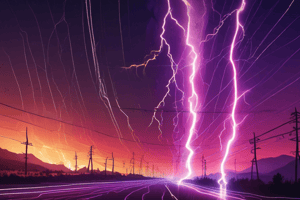Podcast
Questions and Answers
What factor contributes to increased resistance in a conductor?
What factor contributes to increased resistance in a conductor?
- Composition with free electrons
- Larger cross-sectional area
- Short length of the wire
- Higher temperature (correct)
Which of the following statements is true regarding Direct Current (DC)?
Which of the following statements is true regarding Direct Current (DC)?
- It flows in multiple directions.
- It flows from negative to positive. (correct)
- It is commonly generated by AC generators.
- It can be easily transformed into higher voltage.
What is a key advantage of Alternating Current (AC) over Direct Current (DC)?
What is a key advantage of Alternating Current (AC) over Direct Current (DC)?
- AC requires a more complex generation process.
- AC can be distributed over larger distances with lower voltage drop. (correct)
- AC is more expensive to maintain.
- AC can only be generated using batteries.
How does the length of a wire affect its resistance?
How does the length of a wire affect its resistance?
Which of the following factors does NOT contribute to lower resistance in a conductor?
Which of the following factors does NOT contribute to lower resistance in a conductor?
What is considered the electrical pressure that causes electrons to move through a conductor?
What is considered the electrical pressure that causes electrons to move through a conductor?
Which of the following is the correct definition of an Ampere?
Which of the following is the correct definition of an Ampere?
What is the ideal outcome when a circuit wire has the correct diameter?
What is the ideal outcome when a circuit wire has the correct diameter?
What describes the term 'Watt' in electricity?
What describes the term 'Watt' in electricity?
Which particle of an atom is sometimes referred to as the negative charge of electricity?
Which particle of an atom is sometimes referred to as the negative charge of electricity?
What will likely happen if there is too much flow of electricity in a small wire?
What will likely happen if there is too much flow of electricity in a small wire?
Which statement correctly describes the concept of resistance in an electrical circuit?
Which statement correctly describes the concept of resistance in an electrical circuit?
What is a characteristic of matter based on the definition provided?
What is a characteristic of matter based on the definition provided?
Flashcards are hidden until you start studying
Study Notes
Electricity
- Electricity is a powerful discovery and a key component of modern civilization.
- It enables sophisticated inventions and technologies that were once considered impossible.
Definition of Terms
- Electron: A negatively charged particle found in atoms, crucial for electric current.
- Matter: Anything that has mass and occupies space. It can exist in solid, liquid, or gaseous states.
- Atom: The basic unit of an element composed of protons, neutrons, and electrons.
- Volt (Voltage): Electrical pressure that forces electrons to move through a conductor (wire). (Think of it like water pressure in a pipe).
- Ampere: The measure of the flow of electricity. Too much flow can cause heat, damage insulation, and trigger fuses or fire.
- Circuit: The arrangement of wires in a building that provides electrical power to outlets and lights.
- Watt: The rate at which electrical energy is used or consumed (power). Measured in volts and amps.
- Resistance: Opposition to the flow of electrical current.
Factors Influencing Conductor Resistance
- Composition: Conductors with free electrons have low resistance.
- Length: Longer wires have higher resistance.
- Cross-Sectional Area: Larger diameter wires have lower resistance.
- Temperature: Higher temperatures increase resistance in metals.
Electric Current Types
- Direct Current (DC): Flows in one direction from negative to positive. Commonly generated by batteries.
- Alternating Current (AC): Continuously reverses the direction of flow. Generated by AC generators.
Advantages of AC Over DC
- Easier and cheaper to produce
- Easier to distribute over long distances with minimal voltage drop
- Can be transformed into higher voltages
- More efficient than DC
Studying That Suits You
Use AI to generate personalized quizzes and flashcards to suit your learning preferences.




